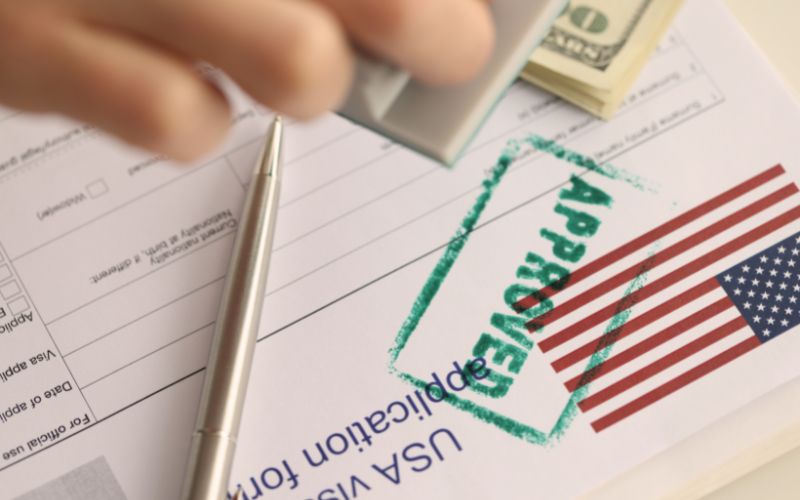
If you’re aiming to qualify for the E-2 visa, one of the core requirements you must meet is the substantial investment—a phrase that can feel like navigating a maze without a map.
Also, understanding substantial investment is key—only treaty country nationals qualify, making your nationality a crucial part of approval.
Moreover, this requirement proves your financial commitment is real, at risk, and strong enough to support a successful U.S. business. The E-2 is one of several visas available to foreign investors seeking to live and work in the United States.
In plain English, it proves you are not just opening a lemonade stand in your backyard but investing serious capital to develop a business that contributes meaningfully to the U.S. economy.
What Is the E-2 Visa?
Before diving deep, let us understand the visa itself. The E-2 visa category allows nationals of certain treaty countries to enter the United States solely to invest in and operate a business here.
Additionally, the E-2 is part of the broader category of E visas, designed to promote international trade and investment between treaty countries and the United States.
This visa is non-immigrant, meaning it doesn’t directly lead to a green card, but it can be renewed indefinitely if the business remains viable.
The E-2 is popular because it offers entrepreneurial freedom and family inclusiveness—spouses can work, children can study, and the investor can build a legacy in the U.S.
Who Qualifies as a Treaty Investor?
Only nationals from treaty countries can apply for the E-2 visa, making the treaty framework essential for eligibility.
The following criteria must be met, to qualify:
- A substantial investment of capital to establish a bona fide operating commercial enterprise;
- They will have operational control or be in a managerial position.
- Their investment must meet the investment requirement without being marginal (i.e., supporting just themselves and their family without broader economic impact).
What Counts as a Substantial Investment?

Many focus on a fixed number, but immigration law sets no specific dollar amount for meeting the substantial investment requirement.
Specifically, immigration officials use several factors to determine whether an investment is substantial, including the business type, investment spending, and the specific industry.
Instead, the proportionality test evaluates your investment’s size relative to total business costs, considering all relevant financial and operational factors.
Determining the sufficiency of the investment also depends on the business model and industry, as different sectors may require different levels of funding to qualify.
No Fixed Dollar Amount — So What Is “Substantial”?
The flexibility of the law allows the government to assess your investment in a proportional sense rather than insisting on an arbitrary threshold.
There is no official minimum investment required by law; however, many attorneys and industry experts recommend investing at $100,000 for E-2 visa applications.
For example:
- For a new business with a total cost of $100,000, an investment of $80,000 is likely to be considered substantial.
- For a business costing $1,000,000, the investment must be higher to meet the “substantial” standard.
This flexibility ensures that investors in smaller ventures are not unfairly penalized, while still demanding a serious commitment from those entering higher-cost markets.
The Proportionality Test Outlined
The proportionality test compares your investment to the business’s value. Franchises and similar businesses often require substantial upfront capital.
It answers the question: Does your investment represent a significant risk and commitment in the context of your specific business?
In immigration terms, the treaty investor’s financial commitment is a key element in meeting the proportionality test. It isn’t just “a drop in the bucket.”
Instead, it should be a substantial amount, irrevocably committed and proportionate to the business’s scale, enough to fuel the successful operation and growth of the company.
The Inverted Sliding Scale
This principle is key to understanding the substantial investment requirement:
- The inverted sliding scale means that a lower percentage of investment may qualify if the sheer magnitude of the capital invested is very high.
- Conversely, smaller businesses need a higher percentage of the total business value invested to meet the test.
- However, the proportionality test varies: established businesses have clear valuations, while start-ups need detailed documentation of initial expenses.
So, if you’re investing $500,000 in a $5 million established business, that 10% might be enough because of the sheer dollar value. But if you’re launching a start-up with a $100,000 total cost, you’ll need to invest a much larger portion, maybe 70-80%, to be considered substantial.
Types of Qualifying Investments
For the E-2 visa, your investment must be active and at risk—not idle funds—to meet the substantial investment requirement.
Here’s what counts as qualifying investment:
- Capital assets like equipment, inventory, or leasehold improvements — the stuff that keeps your business humming day-to-day.
- Money spent on website development or marketing campaigns that are essential for your business to reach customers and grow. Think of this as investing in your brand’s digital storefront.
- Fees paid to consultants or attorneys are essential—not just paperwork, but vital support in building and launching your business.
- Cash placed in a business account for operations shows commitment and keeps funds separate from personal expenses, proving serious intent.
- Costs related to setting up the operational side of things — whether that’s establishing a supply chain, leasing a commercial space, or buying essential licenses.
Expenses to obtain necessary insurance coverage, which signals you’re running a legitimate, risk-managed, operating commercial enterprise.
What Does NOT Qualify?
On the flip side, some types of “investment” just don’t cut it for the E-2 investment requirement:
- Passive investments — funds just chilling in your personal bank accounts with no link to the business. If the money isn’t actively fueling your company, it doesn’t count.
- Speculative capital — money you haven’t irrevocably committed yet. For visa purposes, hesitation or plans to invest down the line won’t satisfy the substantial investment requirement.
- Investments in other corporate devices with no operational role — think shell companies or empty entities that don’t actively develop or support your business. USCIS can see right through those.
Building a Compliant E-2 Business

When it comes to the E-2 visa, you can’t just set up a business that’s all smoke and mirrors — no “mailbox companies” or paper-only operations. Immigration officials want to see real businesses actively operating and contributing to the U.S. economy.
Sure, starting a brand-new business means you’ll face more scrutiny, but if you’re stepping into an established business with a proven track record, that’s a big plus for your case.
Moreover, to meet the substantial investment requirement, your business must be active, for-profit, and capable of generating income beyond personal support.
Hiring employees? That’s huge. Job creation is a major green flag for immigration officers because it shows your business isn’t just running in place — it is growing and contributing to the economy.
Your business model is your blueprint, clearly showing how your funds are used and how the business operates daily. Here’s what your model should make crystal clear:
How Your Qualifying Funds Are Allocated
Your financial commitment means actively investing funds into business needs—not just transferring money—ensuring growth and long-term success.
This includes equipment, inventory, website, lease, marketing, and professional fees essential to launching and operating your business successfully.
Transparency matters. Detailed records like bank statements, receipts, and contracts prove your investment is committed and actively driving business growth.
The Role You Play in Operational Control and Managerial Positions
Immigration law requires active involvement—holding operational control or a key role, not just being a silent partner observing from afar.
Additionally, showcase your skills in operations and leadership to prove you’re actively involved—not just investing—in building a successful business.
Plans for Successfully Developing the Business and Expanding Its Footprint
The government doesn’t support businesses that merely get by. Instead, they want to see a growth plan — clear, realistic strategies to scale, open new locations, or add new products or services.
Your business plan must outline finances, expenses, and job creation—essential for meeting the E-2 visa’s substantial investment requirement.
A solid development plan proves your business’s long-term commitment to thrive and contribute meaningfully to the U.S. economy.
Your E-2 business must be active, fully funded, and directly managed by you—not just a concept or passive investment.
The franchisor owns the brand and systems; the franchisee buys rights to operate a business under that established brand. Together, they form a collaborative business relationship.
A franchise agreement outlines legal terms, responsibilities, and fees, while also establishing a trusted, goal-driven long-term business partnership.
When both sides understand their role, the franchisor-franchisee relationship becomes a powerful driver of growth, consistency, and success.
What Does a Franchisee Do?
As a franchisee, you own and operate your local business. You’re not alone—you’re using a proven business model, a major advantage when launching in a new, unfamiliar market.
Documentation: Proving Your Substantial Investment
Meeting the investment requirement means proving your funds are properly deployed and documented at fair market value to satisfy immigration scrutiny.
For this reason, a meticulously prepared documentation package can significantly enhance your credibility and improve your chances of approval. Here’s what you’ll need:
Bank Statements and Business Bank Account Records
Your business bank account is vital. Clear records of deposits and expenses show funds were actively invested, not idle or personal.
Additionally, bank statements help prove your treaty investor’s financial commitment is more than just theoretical—it’s tangible and trackable.
Receipts for Capital Assets and Professional Services
To prove your investment, submit receipts and invoices for capital assets and professional services like legal, accounting, or website development.
Moreover, these documents support your claim that your investment is not speculative or passive but irrevocably committed to building a legitimate business.
Contracts, Leases, and Purchase Agreements
If you’ve purchased an existing company or leased office space, the purchase price, lease agreements, and contracts serve as critical proof of investment at fair market value.
These documents prove your capital matches real business expenses, meeting the proportionality test required by U.S. immigration law.
A Business Plan Outlining Financial Projections, Industry Analysis, and Job Creation Estimates
Your business plan is the narrative that ties all your documentation together. It should include:
- Detailed financial projections showing revenues, expenses, and profits over time
- An industry analysis that contextualizes your business within the market
- A job creation plan that forecasts employment growth, demonstrating the business’ economic impact beyond your support
This plan, backed by documentation of your investment, proves your enterprise meets E-2 requirements and is built for long-term success.
How Much Is Enough? Real-World Examples
Here’s a practical breakdown to give you a sense of scale:
Industry Type & Typical Investment Range
- Service-based business: $50,000 – $150,000
- Retail or franchise: $80,000 – $250,000+
- Manufacturing/Tech: $250,000 and up
Each investment must align with the total cost and viability of the business.
Professional Guidance: The Smart Investor’s Shortcut
Navigating the E-2 visa labyrinth requires professional guidance:
- Immigration attorneys ensure your investment meets the investment requirement and help you avoid pitfalls
- E-2 franchise consultants can identify visa-compliant business opportunities that align with your capital and visa goals
- Financial advisors help structure your treaty investor’s financial commitment in a way that maximizes your visa eligibility
Conclusion: Think Strategy, Not Just Spend
In essence, the substantial investment requirement is about smart spending, clear commitment, and building a business set for U.S. growth.
For visa purposes, the government wants to see that your investment is proportional, your business is active, and your role is hands-on.
If you plan meticulously, document everything, and seek professional guidance, you will transform your qualifying investment into a strong case for E-2 visa success.
